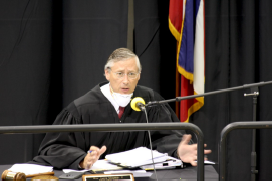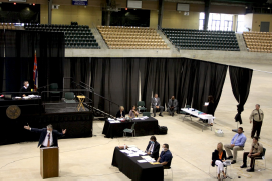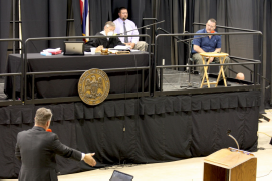
Administrative Office of Courts
|
Batesville Civic Center becomes a courthouse June 4, 2020  The arena of the Batesville Civic Center in Panola County became a courtroom on Monday and Tuesday, June 1 and 2, as the first felony criminal jury trial was completed in the state since the COVID-19 pandemic arose. The Panola County Board of Supervisors on Monday adopted a resolution declaring the Civic Center as the courthouse for the Second Judicial District of Panola County. The City of Batesville owns the Civic Center. COVID-19 was responsible for relocating the court to the Civic Center to accommodate jurors with space for social distancing. Prospective jurors were spaced out with five empty seats between them and alternating empty rows. Monday morning, 102 prospective jurors answered their summons to appear in court, said Panola County Circuit Clerk Melissa Meek-Phelps. From that pool, a jury was selected to hear the trial of Clinton Winters, 44, of Webb, whom the State charged with possession of methamphetamine. Circuit Judge Smith Murphey, V, told prospective jurors that they were part of something historic and important. “Jury trials are the bedrock of our democracy.” He explained that they were called to service because courts can’t shut down. Mr. Winters, as all accused, had the right to “a public trial by an impartial jury.” Article 3, Section 26 of the Mississippi Constitution. Furthermore, Article 3, Section 24 of the Mississippi Constitution reads, “All courts shall be open . . . .” Since the COVID-19 outbreak, the Mississippi Supreme Court has issued a dozen Emergency Administrative Orders, including granting local judges the authority to continue cases dependent upon local circumstances during this national and statewide pandemic. These emergency administrative orders have advised all courts in this State to fulfill their constitutional and statutory duties to keep courts open, while limiting the aggregation of participants in legal proceedings. Emergency Administrative Order 2, issued March 15, authorized judges to postpone jury trials until mid-May. The Mississippi Supreme Court, in consultation with state health officers, examined epidemiological data in its efforts to ensure that all courts remained open and all citizens’ constitutional rights were protected. As more empirical data was made available, the Mississippi Supreme Court permitted local authorities to begin summoning jurors. Emergency Administrative Order 11, issued by the Supreme Court on May 7, authorized courts in 41 counties with one or fewer COVID-19 deaths per month to summons jurors to report on or after May 18. Panola County at that time had two reported deaths. Since then, a third death was reported in Panola County. The Mississippi State Department of Health has identified 84 COVID-19 cases in Panola County as of June 2. Meek-Phelps told prospective jurors on Monday morning, “We really appreciate all of your being here. It’s an inconvenience, but it’s the most important civic duty you will perform.”  Judge Murphey told jurors Monday morning, “Your safety is paramount. Your time is precious. We appreciate your being here.” He reassured jurors that the court had taken steps to protect their health. “Before you arrived here, great lengths were taken to sanitize this facility. Everything was wiped down.” The process would be repeated overnight. County personnel took temperatures of jurors as they arrived on Monday and Tuesday. Two racks of hand sanitizer stood at the doors of the Civic Center, and more bottles of hand sanitizer were on tables as jurors signed in. Prospective jurors cleaned their hands before they walked in, or as soon as they got inside. Anyone who didn’t come with a mask was furnished one. All court personnel wore masks. Jurors were quiet as they stood in a sprawling semicircle waiting to be seated, then followed the Circuit Clerk’s instructions on seating arrangements. It took about 40 minutes just to seat everyone across six sections of theater style seating. Judge Murphey, Assistant District Attorney Steve Jubera and Public Defender Nick Smith conducted voir dire, a process in which jurors are questioned to determine their qualifications to serve. Three deputy clerks carried microphones to jurors who needed to speak.  Jubera, gesturing expansively, asked jurors to wave their numbered fans to catch his attention and wait for him to look over each of the six seating sections to identify those who wished to respond to questions. Smith asked, “Does anybody feel that they are being punished by being here today?” No one responded in the affirmative. A few people showed up for jury duty although they could have been excused beforehand. A letter was sent to all summoned jurors advising that the Court would excuse anyone who was ill, persons having certain health conditions that could put them at risk, care givers, persons with recent jury service, those over age 65, and a few other circumstances. The letter also included detailed instructions regarding Centers for Disease Control recommendations regarding COVID-19. During voir dire, four people over age 65 were excused. Among them was an 89-year-old man who said he suffered from several immuno-suppressive conditions. Judge Murphey said, “You are exactly who we need to keep safe and not inject into a process like this.” The court also excused several care givers, including a nurse who said she cared for 30 nursing home patients. A jury was seated shortly before 2 p.m. on Monday. The Civic Center in the past has been a venue for concerts, motorcycle and monster truck shows, rodeos and other entertainment. On Monday, microphones meant for blasting music and other entertainment had to be toned down to accommodate legal proceedings. When someone spoke too close to a microphone, the voice boomed. The courtroom layout in the concrete floored arena was the size of an average courtroom. A platform stage held the judge’s bench, which was a table covered with black cloth and a metal and plastic chair. The witness stand, also on the stage, was a chair, a microphone and a wooden folding TV tray. Prosecution and defense tables were folding tables covered with black cloth. Black curtains on tall metal poles framed the courtroom space. Curtains stirred in the strong air flow from an industrial strength cooling system.  The prosecution called four witnesses on Monday and rested its case about 5:15 p.m. On Tuesday morning, Winters took the witness stand. The prosecution called a single witness in rebuttal Tuesday. The jury deliberated for about an hour Tuesday afternoon before finding Winters guilty. He will be sentenced at a later date. He remains in custody. A large meeting room at the Civic Center served as the jury room. Folding tables were set up in a long horseshoe shape for social distancing. The space dwarfed the regular jury room at the Panola County Courthouse in Batesville. Judge Murphey talked with jurors behind closed doors after they concluded their service. “No one felt unsafe,” he said afterwards. Most of them were familiar with the Panola County Courthouse. They said they would not have felt comfortable in the close confines of the Courthouse. They agreed that “it was the right decision to be here,” Judge Murphey said. He said jurors expressed pride in being the first jury to serve. Judge Murphey said, “It was an honor to preside over the first jury trial in Mississippi since COVID-19 and uphold my duty to ensure that the courts of Mississippi are open for business. I am grateful for the assistance of all involved.” #### |